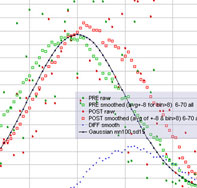by Siegfried Othmer | April 1st, 2016
By Siegfried Othmer, PhD

Patty Duke as Neely O’Hara in the 1967 film ‘‘Valley of the Dolls.’’ Credit 20th Century Fox
The death of Patty Duke places the challenge of Bipolar Disorder front and center. In her case, it was not diagnosed for many years, which is not atypical. Her turbulent life even after it was diagnosed testifies to the fact that the condition was not under good control.
Read More »
Posted in Neurofeedback | 1 Comment »
by Siegfried Othmer | March 16th, 2016
By Siegfried Othmer, PhD
 In the previous newsletter on this topic we supported the case for cognitive skills training as a sister technology to neurofeedback, and we disparaged the case that the FTC has been making against Lumosity in particular. But how does cognitive skills training actually stack up against neurofeedback? This is a useful discussion to be had.
In the previous newsletter on this topic we supported the case for cognitive skills training as a sister technology to neurofeedback, and we disparaged the case that the FTC has been making against Lumosity in particular. But how does cognitive skills training actually stack up against neurofeedback? This is a useful discussion to be had.
Read More »
Posted in Neurofeedback | 2 Comments »
by Siegfried Othmer | January 28th, 2016
By Siegfried Othmer, PhD
 Science Magazine has just weighed in on the recent sanctioning of Lumosity by the Federal Trade Commission for ostensible over-claiming.(Reference) From our perspective we regard cognitive skills training as a kindred technology to neurofeedback. It’s yet another computer-based method of enhancing brain function. So where do we come down on the issue of the FTC sanction? We come down firmly on both sides of the issue! On the one hand, over-claiming by any of the major players ends up casting a pall on the entire field. And on the other, the FTC may well have exhibited entirely too much regulatory zeal. The review in Science sheds light on the controversy. Read More »
Science Magazine has just weighed in on the recent sanctioning of Lumosity by the Federal Trade Commission for ostensible over-claiming.(Reference) From our perspective we regard cognitive skills training as a kindred technology to neurofeedback. It’s yet another computer-based method of enhancing brain function. So where do we come down on the issue of the FTC sanction? We come down firmly on both sides of the issue! On the one hand, over-claiming by any of the major players ends up casting a pall on the entire field. And on the other, the FTC may well have exhibited entirely too much regulatory zeal. The review in Science sheds light on the controversy. Read More »
Posted in Neurofeedback | 4 Comments »
by Siegfried Othmer | January 25th, 2016
By Siegfried Othmer, PhD
 Amajor divide within the field of neurofeedback is the basic question of whether we are aiming to improve function or to expunge dysfunction. This distinction was highlighted crisply many years ago when one of the early researchers, Barry Sterman, said that if he could not identify a deficit in the EEG he would be ethically compelled to send the client home. There would be nothing for him to do.
Amajor divide within the field of neurofeedback is the basic question of whether we are aiming to improve function or to expunge dysfunction. This distinction was highlighted crisply many years ago when one of the early researchers, Barry Sterman, said that if he could not identify a deficit in the EEG he would be ethically compelled to send the client home. There would be nothing for him to do.
Read More »
Posted in Neurofeedback, Peak Performance | 2 Comments »
by Siegfried Othmer | January 25th, 2016
By Siegfried Othmer, PhD
 Picture a young man with a long-term history of schizophrenia and PTSD coming for his first training session with infra-low frequency neurofeedback. At the end of the session he is surprised that he does not feel like smoking. It had been a couple of hours since he last lit up. At the fifth session, he mentioned to the practitioner that he hadn’t smoked since session four. The therapist checked his notes: It had been nineteen days since session four.
Picture a young man with a long-term history of schizophrenia and PTSD coming for his first training session with infra-low frequency neurofeedback. At the end of the session he is surprised that he does not feel like smoking. It had been a couple of hours since he last lit up. At the fifth session, he mentioned to the practitioner that he hadn’t smoked since session four. The therapist checked his notes: It had been nineteen days since session four.
Read More »
Posted in Neurofeedback | No Comments »
by Siegfried Othmer | January 12th, 2016
By Siegfried Othmer, PhD
 Basketball phenom Charles Barkley urged parents years ago not to let their children play football. The hazard of injury was too great. Now Dr. Bennet Omalu has issued the same caution. He delivers an even stronger message: Children should not be allowed to play high-impact contact sports until they are old enough to make their own decisions—the age of maturity in each state.
Basketball phenom Charles Barkley urged parents years ago not to let their children play football. The hazard of injury was too great. Now Dr. Bennet Omalu has issued the same caution. He delivers an even stronger message: Children should not be allowed to play high-impact contact sports until they are old enough to make their own decisions—the age of maturity in each state.
Read More »
Posted in Neurofeedback | 3 Comments »











